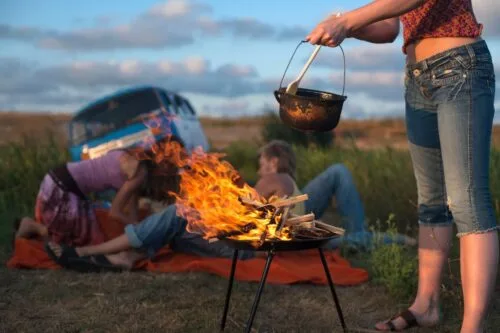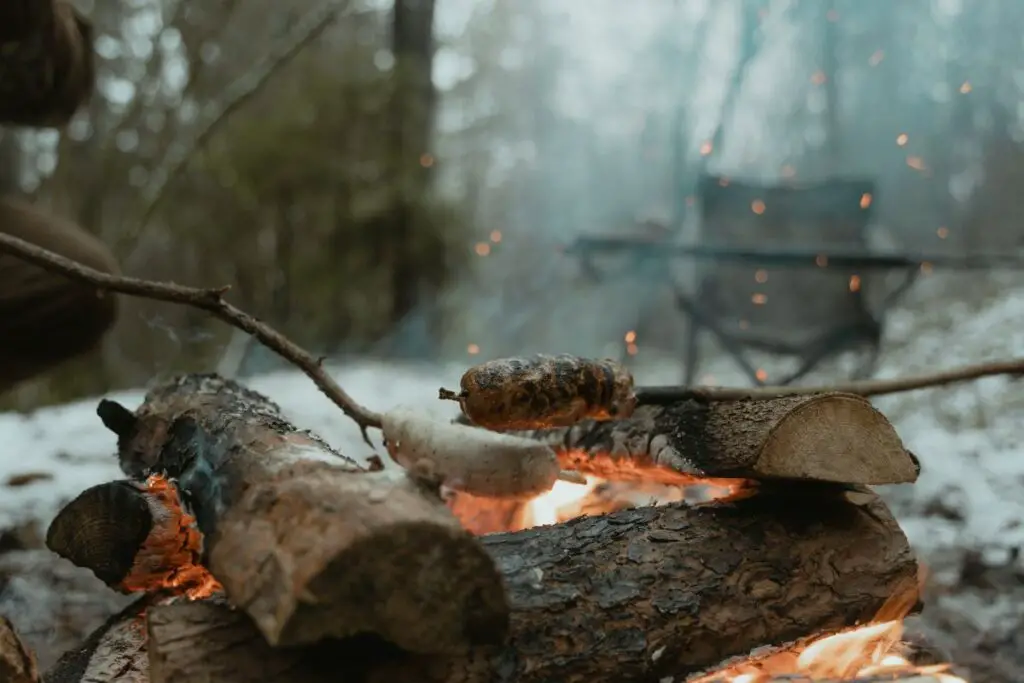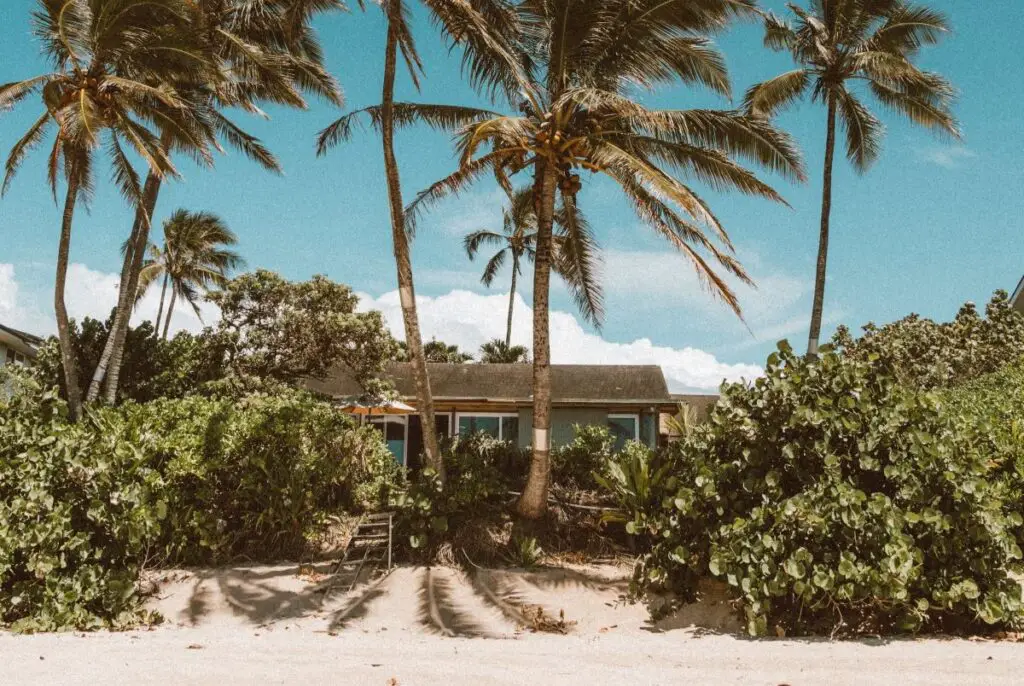Living off the Grid: How to Embrace Self-Sufficiency and Peace
The dream of living off the grid and experiencing self-sufficiency as a lifestyle is becoming a more popular notion in this rapidly developing world. It’s easy to see why from the peace and quiet the living off the grid lifestyle gives and the freedom and security knowing if the current state of our world ends your self-sufficiency will make you a survivor.

Whether you are neurotypical or neurodivergent, this lifestyle definitely comes with challenges. It’s far from easy, according to individuals living off the grid, so it’s not for the unmotivated or undisciplined individuals.
There’s a reason why people choose to live with the support of the government and today’s modern conveniences, but people have been living this self-sufficiency life since the beginning of time. My take is that if all these people and your ancestors could do it, then you can too. The real question is whether you would truly want to.
As far as me personally, I dream of this life of living off the grid. I love the idea of buying my own land, building my own house, and growing my own food (because honestly I don’t really trust the food from large-chain supermarkets).
I first heard about this lifestyle when visiting Alaska a few years back, and hearing how many of the families rely on self-sufficiency to survive the long, cold winters there. I heard from a dog musher whose families raised sled dogs (and still does) as well as someone who makes their livelihood fishing.
They both talked about how they spent their summers preparing for heat (from wood) and ability to create minimum energy for the long dark days. I was impressed with how proud and accomplished they were of their self-sufficiency lifestyles they mostly still incorporate today.
There is a peace and a feeling of ownership of your own life that’s hard to get in modern civilization because so much of your life is dictated by the government services, and with it’s taxes. I understand taxation and what it provides, and I am not debating this. But self-sufficiency holds great appeal to me, and apparently I’m not alone.
This life isn’t for everyone and there’s nothing wrong with living in a house built by someone else for some company that was bought with a home loan, but some people find it very gratifying to build everything they have with their own hands.
If this living off the grid lifestyle sounds great to you, do some research, make some money so you can buy some land, and don’t be afraid to get started even if it is a long term goal vs. short term. With any journey, the first step is always the hardest.
RELATED: Self-Identity – The Ultimate Guide to Finding Your True Self and Self-Awareness Examples
Why Living Off The Grid and Adopting Self-Sufficiency Holds Great Appeal
Modern life, with its fluorescent lights, constant noise, cell phone signals, and overcrowding can be intensely overwhelming for many people, especially those on the autism spectrum like me. Sensory overload and lack of personal space triggers anxiety.
Is it any wonder that some autistic people dream of escaping the chaotic modern world to live a quieter, simpler life off the grid?
Going off the grid means disconnecting from public utilities, eliminating reliance on modern technology as much as possible, and striving for self-sufficiency in areas like food, water, and energy. For some on the spectrum, gaining strict control over their immediate environment in this way promises less stress and better ability to focus.
RELATED: 10 Proven Techniques for Managing Autism and Sensory Issues
Deciding If Off-Grid Life Is Right For You
First, carefully reflect on your temperament to determine if you have the necessary skills and mindset for the radical off-grid lifestyle shift. Resourcefulness, flexibility, a hands-on DIY approach are all essential when it comes to maintenance, farming, animal husbandry, wild foraging and more. Modern conveniences disappear for items you need to make, grow, hunt or barter for yourself.
Cultivating an off-grid homestead and self-sufficiency is backbreaking work. Take an honest assessment of your physical health and capabilities when it comes to hauling water, digging, construction, splitting wood and other intensely physical chores required from dawn to dusk. If coping with unpredictable weather events and troubleshooting constant emergencies sounds potentially devastating rather than invigorating for you, take heed before pursuing off-grid living.
For those on the autism spectrum, ease of access to personal space to retreat to along with carefully constructed routines are often keys to stability. Determine what modern comforts genuinely can’t be given up before committing fully to off-grid experimentation. Could intermittent internet access actually provide critical links to animal care tutorials, homesteading discussion forums and connections that enrich your isolated world?
Maybe occasional stays in nearby small towns for proper medical care and community interaction will better sustain your off-grid ambitions rather than permanent isolation. It doesn’t have to be an all-or-nothing approach. You can choose a more selected approach, if you like.
Take baby steps first, perhaps by camping more in remote areas without electronics or trying a weekend in a rustic cabin. Can suitable adjustments provide the optimal balance between modern conveniences and off-grid simplicity?
For those who find total isolation preferable long-term, assembling the proper homesteading knowledge, skills and means takes time. Rushing into off-grid living often ends in prompt, dangerous failure for even ruggedly adept pioneers.
I’ve found this video that showcases self-sufficiency success that you might enjoy. The person featured has adopted this lifestyle for 50 years. Another inspirational video features a couple who live on a self-built island and enjoy living in the rhythms of nature.
RELATED: Top Ways Nature Therapy Transforms Lives of Individuals with Autism
Weighing the Life Quality Payoff
Off the grid veterans emphasize that adapting to wildly different daily expectations requires monumental effort and lifestyle sacrifice. But for some, gaining direct control over their immediate environment promises improved quality of life. Eliminating manmade overload and distraction by disconnecting from most technology facilitates more sensory integration and rich nature immersion.
For autistic off-gridders seeking simpler sensory worlds, gains in mental health and life skills along with liberating lifestyle freedom make monumental effort worthwhile.
The appeal is great, but many try and fail because they lack the motivation and discipline needed to make the lifestyle one that is successful.
RELATED: Staying Motivated to Unlock Full Potential and Why Discipline is One of Life’s Best Virtues
Downsizing Possessions Strategically
For those resolute on committing to the radical off-grid transition after careful self-examination, strategic downsizing comes next. Storage space disappears off-grid, so materialism and accumulation must end. Any items not vitally useful or sparking daily joy will probably be shed quickly without mourning anyway once the daunting work of survival with minimal modern amenities kicks in.
Create a multi-step plan for reducing and sorting possessions in phases while ameliorating uncertainty about letting go of sentimental items or hobbies that may still enrich off-grid life.
Customized music playlists might make chopping wood more pleasant if you have some type of power source or can utilize batteries. Art and writing projects provide much needed creative outlets during long winter nights devoid of digital entertainment options. Modern conveniences shouldn’t always represent total loss once removed from the conventional grid but rather opportunities for nostalgic enjoyment in moderation.
RELATED: Creativity Explained – How Neurodiversity Can Fuel the Arts
Budgeting Smartly for Off-Grid Life
Even simple off grid living requires significant upfront and recurring investment. Budget wisely for vital survival items first before items that aren’t absolutes. Creating savings takes discipline and realistic revenue streams help too.
Some remote homesteaders run small online stores selling homemade items like candles or carved hiking sticks to weekend adventurers. Teaching wilderness survival lessons to groups provides hands-on knowledge transfers along with campfire camaraderie. Savvy off-gridders creatively add multiple income sources helping sustain their preferred lifestyle solitude.
Calculating exactly what establishing a functioning homestead requires helps determine the minimum viable budget. Creating redundancy for critical items provides essential backups like extra tools or seeds securing survival through unforeseen events.
Expect costs spanning:
- Rural land itself
- Housing like RVs, yurts, tiny homes (construction/transport)
- Equipment: solar panels, generators, gardening tools
- Water access for bathing, drinking, irrigation
- Crops, livestock for sustenance
- Food preservation supplies
- Seasonal needs: warm clothing, firewood
- Transport: horses, bikes, fuel for emergencies
- Medical: first-aid training, supplies, checkups
- Schooling alternatives if kids join off-grid life
Budget padding for unseen costs during early transitional years further protects off-grid ambitions and retains options if original plans prove temporarily unfeasible. Hard work and rugged frontier existence still beats returning defeated to chaotic modernity for some autistic off-grid pioneers.
Achieving a haven purpose-built to autistic needs ultimately makes profound lifestyle sacrifice worthwhile.
Preparing Mentally for the Off-Grid Transition
Adjusting expectations ahead of time establishes realistic mindsets for the harsh off-grid learning curve. Prioritizing flexibility preserves morale when things don’t go according to plan. Initially, seemingly straightforward chores like tending garden beds or repairing fences consume entire days rather than mere hours as in modern life because proper tools and supplies were lacking.
Frustration tolerance increases by remembering the autistic need for escape from modern chaos as motivation during periods when off-grid dreams descend into exasperating hardship instead. Patience grows by acknowledging that homesteading mastery develops slowly over years through humbling trial and error.
Perspective retains gratitude for autistic refuge overall despite frequent setbacks. Decades growing the perfect off-grid oasis for aging autistic residents awaits rather than some quick weekend experiment. Committing to incremental daily progress over lifelong horizons recalibrates unreasonable expectations.
Daily meditation also centers determination when harsh reality tests resolve. Envisioning mindful communion with nature revitalizes strained optimism over years required to tame wild lands sustainably.
Ultimately for some, just escaping society’s relentless noise and distraction makes off-grid struggles worthwhile regardless of outcomes. Silence and stars shared only with curious wildlife already promise profound gifts. Natural connection absent modern judgment or demands becomes healing reward unto itself.
RELATED: Boredom Busters – Why Bored With Life Can Actually Be A Good Thing
Seeking Out Community Connections Thoughtfully

Study niche sites like Homesteading Today to tap into specialized forums covering essentials like wild herb identification or axe sharpening techniques.
While electronic connectivity typically is necessary when starting off-grid living, beware of excessive screen time. Set firm limits because displacement from modernity represents the ultimate purpose of self-sufficiency. Allow focused virtual mentoring connections without enable full descent back into digital dependency, threatening off-grid contentment.
I realize this would be a challenge for me, as I like to watch videos on social media challenges and enjoy reading and watching movies. I’ve been trying to read more books instead of reading shorter pieces on the internet, as a way to circumvent dependency on my phone, for example.
In person, seek out experienced off-grid community members willing to directly mentor newbies through invaluable hands-on guidance. Learn coveted tricks perfecting rustic skills from baking your own bread to fermenting garden surplus into storable sauerkraut, keeping scurvy away through long winters.
Plus, off the grid living doesn’t have to mean isolation from others. You can gain new friends sharing unique lifestyle wisdom and fellowship strengthening resolve, when chasing chickens seems endless and spring thaw is nowhere in sight.
RELATED: How to Leave the Screens of Social Media and Making a Connection – The Forgotten Joy of Finding Third Places
Preparing for Off-Grid Emergencies
While seeking more independence and self-sufficiency drives off-grid dreams, also prepare for dealing with emergencies when no help may come.
Consider first aid, emergency medical training, or connecting with staff at a rural health clinic. Prepare an emergency contact list. Identify scenarios that would require urgent outside assistance, such as injury, illness, fire, extreme weather, predatory animals.
Stock emergency supplies for likely risks in your region, as well as enough food, water and medicine to survive for a week or two in isolation. Create firebreaks to protect buildings if you live in fire-prone wilderness. Have an evacuation plan mapped out accounting for seasonal access limitations such as snow cover.
Own equipment to rapidly transport supplies and injured people. While owning a mode of transportation means you aren’t entirely off the grid, it is something many people choose for finding a balance when it comes to safety and emergency needs.
Carefully assess risks before each winter on your self-reliant homestead and upgrade precautions accordingly. Thinking through emergency preparedness boosts self-sufficiency and provides essential peace of mind.
More than just peace and quiet, off-grid life also offers tremendous freedom. Without rent, mortgages or a 9-to-5 job tying you down, your days are wholly your own to structure as you please according to your own natural rhythms. For autistic people who chafe at strict schedules and rigid societal expectations, that autonomy can be incredibly liberating.
That self-sufficiency also brings legitimate pride. When you look around your homestead at crops you planted yourself, meals you cooked with your preservation efforts, clean water you sourced yourself, and energy you harness from the sun, wind and water — you’ll know exactly what it takes to sustain your own life independently.
Not only is that profoundly empowering, but it also cultivates confidence and self-esteem. Knowing your capabilities to meet life’s basics forges purpose and motivation.
RELATED: 7 Skills That Empower Individuals to Thrive
Overcoming Off-Grid Growing Pains
Even the most thoroughly planned off-grid transition hits snags. Unanticipated challenges arise daily on isolated homesteads lacking modern conveniences. Adapting expectations prevents discouragement when romanticized dreams collide with stark reality. Incremental celebrations for small wins preserve morale and determination while accumulating vital self-reliance skills slowly.
Gardening off-grid demands patience learning soil nuances the hard way through repeated seasons. Adjust crop choices annually based on successes and failures from previous harvests. Keep tweaking timing for optimal planting and harvesting while gathering wild edibles as backup.
Mastering suitable irrigation, pest control, and fertilization leveraging on-site resources exclusively keeps refining through long trials. Persisting despite crop losses pays off eventually with mold-defying winter squash stacked high in your food storage area by autumn.
Livestock also require slow mastery predicting needs, preventing disease, and increasing yields using local feed sources exclusively. Adjust herd size annually to prevent overgrazing fragile pasture land lacking commercial fertilizer.
Customize hardy shelter and enclosures shielding vulnerable animals from extreme weather, predators, injuries and illness. Refining homegrown remedies and midwifery skills prevent over reliance on expensive veterinary interventions. Progress rewards years coaxing nature’s bounty from the land sustainably.

Customize collection and storage systems maximizing precious, clean hydration for people, plants and animals through droughts. Potability develops from mastering solar distillation, creative sand filtration, careful rain harvesting and more.
Energy reliance shifts from fossil fuels to firewood, biogas from manure, human power augmented with wind, hydro and solar innovations. Mastering nucleus colony beekeeping generates coveted wax for candles illuminating long nights. Every off-grid system interrelates, so progress in one area enhances the others exponentially.
Gardening generates organic waste fueling biogas generators. Those run modified appliances, tools and equipment supporting construction expanding housing and outbuildings needed for the homestead’s increasing bounty and residents.
As you can tell just by reading this, it can be overwhelming, and that is why small steps and perhaps weekend outings or retreats initially make sense so that if you do decide to go all-out in the future, you can be successful.
Prioritizing Self-Care Steadily
Completely disconnecting from modern society rarely succeeds instantly when going off grid. Be gentle with yourself by incrementally reducing reliance on electronics and other tools compromising self-sufficiency rather than insisting on absolute elimination immediately.
Can a laptop run solely on solar help access animal husbandry tutorials and dire emergency communication temporarily? Are occasional grocery runs truly necessary while mastering crop rotation and preservation?
Carefully preserve elements of beloved pastimes enriching quality of life rather than fully abandoning supportive outlets like art, music and literature cold turkey. Loading an e-reader with hundreds of books bought previously costs nothing to store off-grid.
Carving out space for creative expression, exercise for sore muscles, and tasty familiar recipes provides needed comfort and joy bolstering mental health.
Stay connected with any close friends able to understand the unusual off-grid lifestyle. Schedule occasional visits or remote digital conversations preventing harmful isolation. Seek understanding professionals able to provide telemedicine or remote autism support as needed too.
Being wholly self-reliant rarely means completely alone. Instead sustainable off-grid living includes interdependent community connections, both local and digital, enriching the profound freedom of carving out an oasis finally hospitable for the autistic mind.
So for those autistic people willing to work hard and live simply, off-grid life promises very real rewards of freedom and self-reliance — a rare achievement in modern society. With careful forethought, effort and courage, escaping chaos by creating your own off-grid refuge tailored perfectly to autistic needs makes profound sacrifice worthwhile.
RELATED: The Importance of Gratitude Attitude and How It Makes Life More Beautiful
I’d like to hear if any of you are considering living off the grid, or at least unplugging some, this coming year.
Reach me anytime at connor@myautismmind.com.
Additionally, if you liked this article, you might enjoy these challenges individuals on the spectrum often face.
Challenges Individuals with Autism Face
Learn more about challenges and other issues that autistics face:
- New Research Reveals Autism Mental HealthLinked to These Disorders
- Is Autism a Disability? Surprising Reasons for the Debate
- Autism and Holidays: Why Special Occasions Can Be Challenging
- 6 Fascinating Facts About Autism You Probably Didn’t Know
- Autism and Poor Hygiene: The Smelly Truth to Overcome
- Breaking Down Barriers that Challenge Autism and Friendships
- Anxiety and Autism: 5 Powerful Strategies to Conquer Emotions
- Growing Up Autistic: How I Overcame Challenges and Now Thrive
- 6 Ways to Tackle Autism Fireworks Anxietyand Sensory Overload
- Autism Family Support: 5 Ways to Achieve A Happy Household
- 8 Popular Ways to Manage and Master Autistic Social Awkwardness
